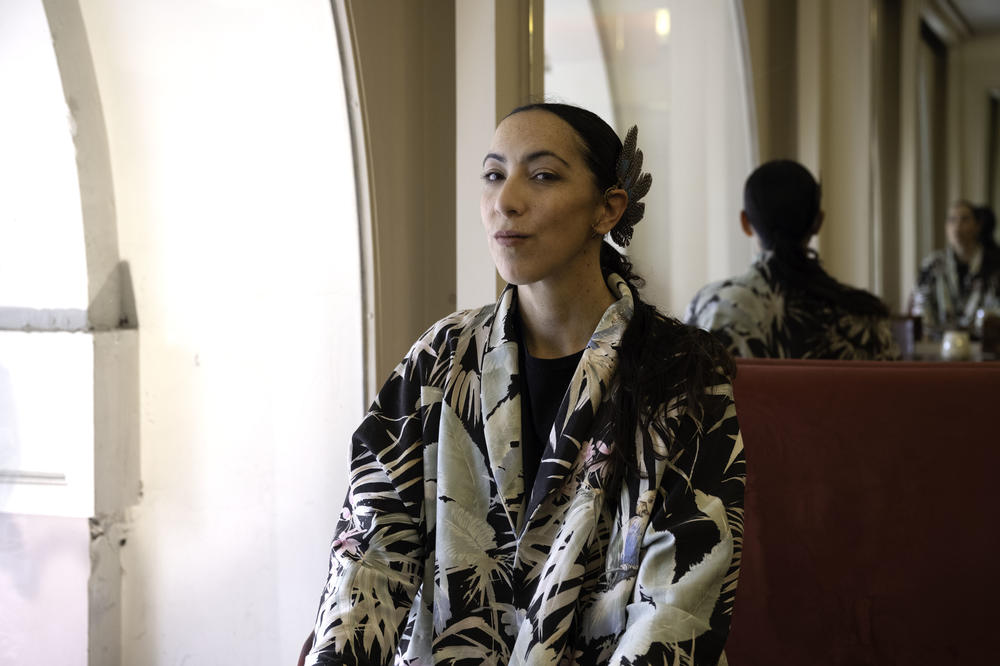Amanda Piña, Valeska Gert Visiting Professor (Summer Semester 2024)
Amanda Piña splits her time between Vienna and Mexico City. As an artist she draws from her mixed ancestry (Mestiza, Cheje), which includes Mapuche, Spanish, and Syrian-Palestinian roots. Piña is a plurifaceted artist working through choreographic and dance research, creating and curating educational frameworks, and writing and editing publications. Her artistic work focuses on the political and social power of movement to temporarily dismantle ideological separations between contemporary and traditional, human and animal, nature and culture. She works within performing and visual arts contexts.
Piña’s work with master’s students in the dance studies program at Freie Universität Berlin delves into the reappearance of oceanic movements, probing the ocean as a repository of ancestral knowledge. First, she examine Afro-diasporic expressions of embodied ancestral knowledge, encoded in dance and sound, which thrived in Abya Yala* (the Americas) and transcended ethnic boundaries to also be embraced by non-African descendants in regions like Mexico, Cuba, Haiti, and Brazil.
Second, she explores oceanic movements on a broader scale, encompassing the motions of ancient animal species – such as sponges, cnidarians, mollusks, and echinoderms – as well as the historical and contemporary movements of ocean currents, diasporas, and migrations. Her work at Freie Universität Berlin this 2024 summer semester addresses the ocean as a nexus of origins, transit, and demise, yet also as a vibrant ecosystem crucial for the sustenance of life on Earth.
Together with MA students in Critical Dance Studies, she continues her multi-year project called “Endangered Human Movements,” which embodies the political and social power of movement, grounded in indigenous forms of knowledge and world making/maintaining practices. The long-term project Endangered Human Movements, which Piña initiated in 2014, focuses on human (and non-human), movement practices that have been cultivated for centuries all over the world. It incorporates critical perspectives from the fields of anthropology, decolonial theory, and contemporary Amerindian and Afro-diasporic knowledge traditions. The latter encompasses not only contemporary shamanic practices but also orally transmitted knowledge, social knowledge about the body, about dance, movement, and touch, about healing, about plants, about perception, about the interconnectedness of life forms, and about ritual diplomatic knowledge applied to the relationships with other beings.
The Valeska Gert Program
A cooperative effort of the Freie Universität, the German Academic Exchange Service (DAAD), and the Akademie der Künste Berlin.
The Valeska Gert Visiting Professorship at the Institute of Theatre Studies has been in existence since the 2006/2007 winter semester. This program is supported by the Freie Universität Berlin, the German Academic Exchange Service (DAAD) and the Akademie der Künste Berlin.
The guest professorship is named after one of the most innovative dancers of the historical avant-garde, Valeska Gert (1892-1978), whose work was characteristic of the city of Berlin. She is thus representative of dancers and choreographers who are yet to be discovered and whose history is still to be written.
The function of the guest professorship:
Applying theoretical approaches in practice and, conversely, incorporating practical approaches into the academic discourse is an important part of the Master's degree programme in Dance Studies. It is not so much a case of academics slipping into the role of the artist - rather, students should be given the opportunity to go through research processes based on concrete projects in which theory and practice intermingle. Practice here is definitely also dance-performative execution - but always with an analytical view that seeks to recognise and understand structures and procedures. This work leads to lively discussions about the differences and overlaps between artistic and academic research, as the seminars of previous guest professors have shown. The result is an exchange and dialogue between artists and prospective academics, a mutual insight into the respective working methods, which can certainly be very valuable for the students, but also for the artists.
Further information on the Valeksa Gert Visiting Professorship Program -->
